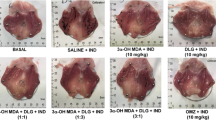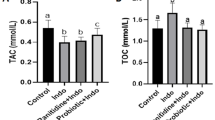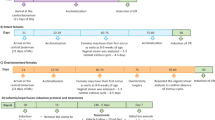Abstract
Increased free radical production with depletion of the antioxidant, glutathione, is a suggested mechanism for the development of ulcer disease in patients with Helicobacter pylori. The effects of ascorbate and omeprazole as potential gut antioxidants are incompletely understood. We hypothesized that as antioxidants, ascorbate and omeprazole protect against glutathione depletion. This study was designed to determine the effects of ascorbate and omeprazole on gastric emptying and gastric antioxidant levels in a mouse model of glutathione depletion. In an acute (10-day) mouse model, glutathione depletion was induced by inhibiting the rate limiting enzyme, γ-glutamylcysteine synthetase. Enzymatic blockade produced depletion of gastric glutathione (P < 0.05) without increasing gastric lipid hydroperoxides. Glutathione depletion was associated with accelerated liquid gastric emptying. These effects were not prevented by supplementation with ascorbate or omeprazole. Omeprazole induced increased (P < 0.05) gastric and colonic total antioxidant capacity. One of the beneficial effects of omeprazole in patients may involve increased total antioxidant capacity.
Similar content being viewed by others
REFERENCES
Khaleld MA, Sarker SA: Changes of oxidant and antioxidant status in humans due to H. pylori infection. Nutr Res 18(9):1463–1468, 1998
Drake IM, Mapstone NP, Schorah CJ, White KLM, Chalmers DM, Dixon MF, Axon ATR: Reactive oxygen species activity and lipid peroxidation in Helicobacter pylori associated gastritis: relation to gastric mucosal ascorbic acid concentrations and effect of H pylori eradication. Gut 42:768–771, 1998
Farinati F, Libera GD, Cardin R, Molari A, Plebani M, Rugge M, Di Mario F, Naccaroto R: Gastric antioxidant, nitrites, and mucosal lipoperoxidation in chronic gastritis and Helicobacter pylori infection. J Clin Gastroenterol 22(4):275–281, 1996
Verhulst M-L, Van Oijen AHAM, Roelofs HMJ, Peters WHM, Jansen JBMJ: Antral glutathione concentration and glutathione S-transferase activity in patients with and without Helicobacter pylori. Dig Dis Sci 45:629–632, 2000
Beil W, Obst B, Sewing K-F, Wagner S: Helicobacter pylori reduces intracellular glutathione in gastric epithelial cells. Dig Dis Sci 45:1769–1773, 2000
Martensson J, Jain A, Meister A: Glutathione is required for intestinal function. Proc Natl Acad Sci USA 87:1715–1719, 1990
White AC, Thannickal VJ, Fanburg BL: Glutathione deficiency in human disease. J Nutr Biochem 5:218–226, 1994
Shibata A, Paganini-Hill A, Ross RK, Henderson BE: Intake of vegetables, fruits, beta-carotene, vitamin C and vitamin supplements and cancer incidence among the elderly: a prospective study. Br J Cancer 66:673–679, 1992
Mowat C, Carswell A, Wirz A, McColl KEL: Omeprazole and dietary nitrate independently affect levels of vitamin C and nitrite in gastric juice. Gastroenterology 116:813–822, 1999
Lapenna D, de Gioia S, Ciofani G, Festi D, Cuccurullo F: Antioxidant properties of omeprazole. FEBS Lett 382:189–192, 1996
Kawamura T, Miyaji C, Toyabe S, Fukuda M, Watanabe H, Abo T: Suppressive effect of antiulcer agents on granulocytes-a role for granulocytes in gastric ulcer formation. Dig Dis Sci 45:1786–1791, 2000
Wandall JH. Effects of omeprazole on neutrophil chemotaxis, super oxide production, degranulation, and translocation of cytochrome b 245: Gut 33:617–621, 1992
Suzuki M, Mori M, Miura S, Suematsu M, Fukumura D, Kimura H, Ishii H: Omeprazole attenuates oxygen-derived free radical production from human neutrophils. Free Radic Biol & Med 21:727–731, 1996
Martensson J, Jain A, Stole E, Frayer W, Auld PAM, Meister A: Inhibition of glutathione synthesis in the newborn rat: A model for endogenously produced oxidative stress. Proc Natl Acad Sci USA 88:9360–9364, 1991
Carlsson E, Larsson H, Mattsson H, Ryberg B, Sundell G: Pharmacology and toxicology of omeprazole-with special reference to the effects on the gastric mucosa. Scand J Gastroenterol 21(suppl 118):31–38, 1986
Koch TR, Yuan L-X, Fink JG, Petro A, Opara EC: Induction of enlarged intestinal lymphoid aggregates during acute glutathione depletion in a murine model. Dig Dis Sci 45:2115–2121, 2000
Ballard TC, Farag A, Branum GD, Akwari OE, Opara EC: Effect of L-glutamine supplementation on impaired glucose regulation during intravenous lipid administration. Nutrition 12:349–354, 1996
Abdella N, Al Awadi F, Salman A, Armstrong D: Thiobarbituric acid test as a measure of lipid peroxidation in Arab patients with NIDDM. Diabetes Res 15:173–177, 1990
Bicheler V, Cherbut C, Ropert A, Roze C, Galmiche JP: Peptide YY increases gastric emptying in rats. Gastroenterology 114(4):A721, 1998
Matsuda M, Aono M, Moriga M, Okuma M: Centrally administered neuropeptide Y (NPY) inhibits gastric emptying and intestinal transit in the rat. Dig Dis Sci 38:845–850, 1993
Pellegrini N, Re R, Yang M, Rice-Evans C: Screening of dietary carotenoids and carotenoids-rich fruit extracts for antioxidant activities applying 2,2'-azinobis(3-ethylenebenzothiazoline-6-sulfonic acid radical cation decolorization assay. Methods Enzymol 299:379–389, 1998
Koch TR, Yuan L-X, Stryker SJ, Ratliff P, Telford GL, Opara EC: Total antioxidant capacity of colon in patients with chronic ulcerative colitis. Dig Dis Sci 45:1814–1819, 2000
Zar JH. Biostatistical Analysis, 2nd ed. Englewood Cliffs, New Jersey, Prentice-Hall, 1984, pp 171–176
Fordtran JS, Walsh JH: Gastric acid secretion rate and buffer content of the stomach after eating. J Clin Invest 52:645–657, 1973
Howlett PJ, Sheiner HJ, Barber DC, Ward AS, Perez-Avila CA, Duthie HL: Gastric emptying in control subjects and patients with duodenal ulcer before and after vagotomy. Gut 17:542–550, 1976
Cucchiara S, Minella R, Campanozzi A, Salvia G, Borrelli O, Ciccimarra E, Emiliano M: Effects of omeprazole on mechanisms of gastroesophageal reflux in childhood. Dig Dis Sci 42:293–299, 1997
Koskenpato J, Korppi-Tommola T, Kairemo K, Farkkila M: Long-term follow up study of gastric emptying and Helicobacter pylori eradication among patients with functional dyspepsia. Dig Dis Sci 45:1763–1768, 2000
Parkman HP, Urbain J-LC, Knight LC, Brown KL, Trate DM, Miller MA, Maurer AH, Fisher RS: Effect of gastric acid suppressants on human gastric motility. Gut 42:243–250, 1998
Rasmussen L, Oster-Jorgensen E, Qvist N, Pedersen SA: The effects of omeprazole on intragastric pH, intestinal motility, and gastric emptying rate. Scand J Gastroenterol 34:671–675, 1999
Suzuki M, Nakamura M, Mori M, Miura S, Tsuchiya M, Ishii H: Lansoprazole inhibits oxygen-derived free radical production from neutrophils activated by Helicobacter pylori. J Clin Gastroenterol 20(suppl. 2):S93–S96, 1995
Yu BP: Cellular defenses against damage from reactive oxygen species. Physiol Rev 74:139–162, 1994
Van den Berg R, Haenen GRMM, Van den Berg H, Bast A: Applicability of an improved Trolox equivalent antioxidant capacity measurements of mixtures. Food Chem 66:511–517, 1999
Wetscher GJ, Hinder RA, Bagchi D, Hinder PR, Bagchi M, Perdikis G, McGinn T: Reflux esophagitis in humans is mediated by oxygen-derived free radicals. Am J Surg 170:552–557, 1995
Ovrebo KK, Sorbye H, Svardal A, Grong K, Svanes K: Glutathione and N-acetylcysteine reduce gastric mucosal blood flow in rats. Dig Dis Sci 42:1765–1774, 1997
Author information
Authors and Affiliations
Rights and permissions
About this article
Cite this article
Koch, T.R., Yuan, LX., Petro, A. et al. Effects of Omeprazole and Ascorbate on Gastric Emptying and Antioxidant Levels in a Mouse Model of Glutathione Depletion. Dig Dis Sci 47, 2486–2492 (2002). https://doi.org/10.1023/A:1020555925142
Issue Date:
DOI: https://doi.org/10.1023/A:1020555925142




